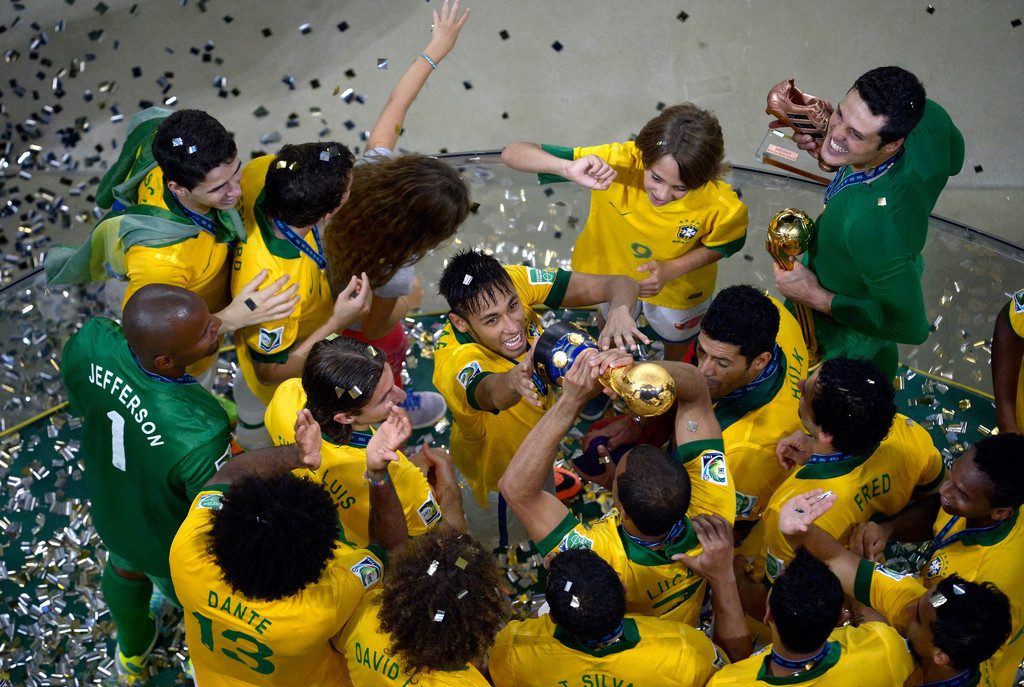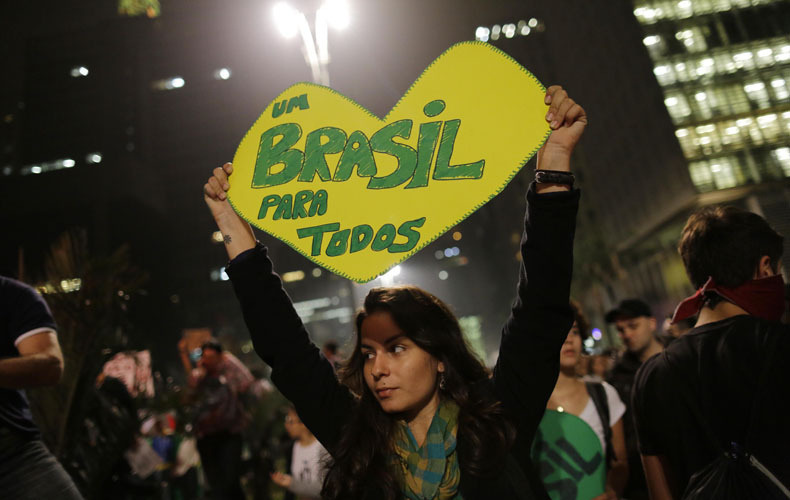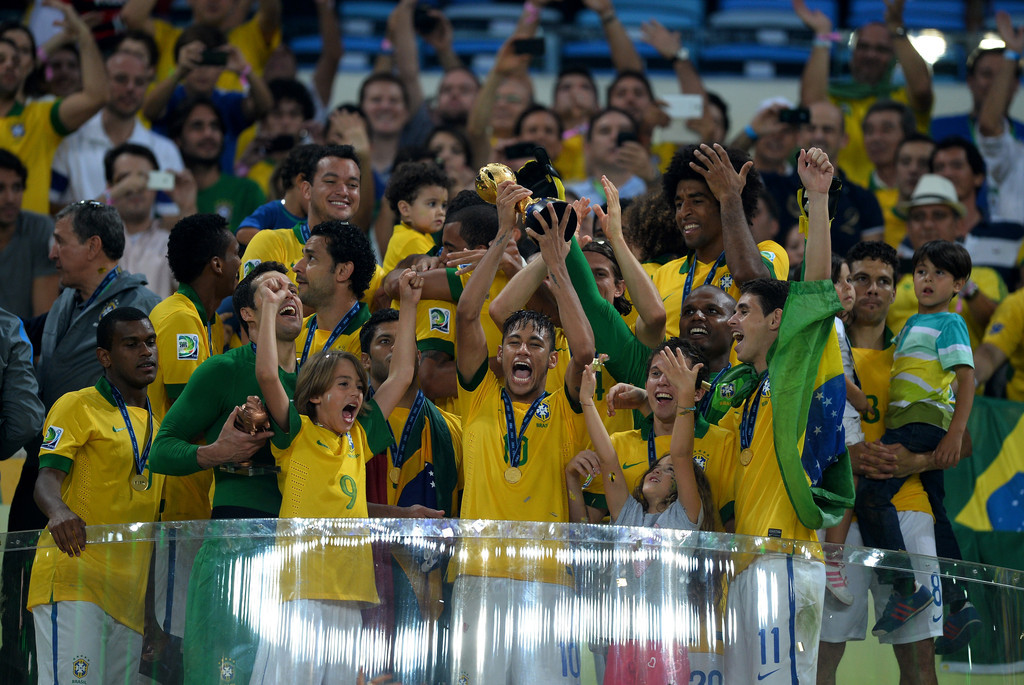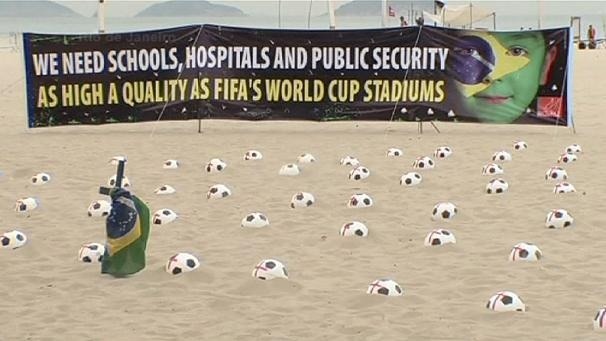What did we learn from Brazil’s dress rehearsal for the World Cup?
What did we learn from Brazil’s dress rehearsal for the World Cup?

What did we learn from Brazil’s dress rehearsal for the World Cup?
The player of the tournament was Neymar, but the smell of tear gas was just as unmistakable. Even though the actual gas did not pass into the stadium, one person wore a mask and real FIFA officials at the start of the Confederations Cup final scrambled for cover. These are the reports.
The damn thing stung the eyes, all the way over there, hundreds of yards away from the ring of small chaos around the Maracana where thousands of protesters clashed with police once more. There, Brazil beat Spain – the greatest team of its era – so convincingly that we all thought the era was coming to an end, and the parties outlasted the protests deep into the night on Sunday.
“These fights that are taking place outside of the stadium,” Neymar told the Associated Press after the match, “this is something that is bad.” But it was also too true and real to deny, the closest the reality of this Brazil came to the actual game, the most it threatened. Police and security stood guard, 10,000 of them, the most heavily enforced match of the tournament that went along with the biggest sight of civil unrest at any final in a FIFA competition.
FIFA’s Sepp Blatter, the man people booed, didn’t think there was anything to be worried about. In a clever turn of words, he said “the unrest is resting,” but only after a fortnight of tremendous activity. More than 1.5 million Brazilians jammed the streets, across 100 cities. Some of the demonstrations were violent. The majority of them were peaceful, and the players, president and coach of Brazil all supported these.
There were highlights: One protester, in iconic words, said “a teacher is worth more than Neymar.” A teacher, even before the Confederations Cup began, told the New York Times “we’re the victims of an event we don’t want.” They attacked the government, under the once highly approved presidency of Dilma Rousseff. They demanded better social services and courts that could properly deal with corruption. They condemned the $15-billion spent on this tournament and the 2014 World Cup. But they asked for it. Just a few years ago, in 2007, the country celebrated the honour to host the World Cup. It was supposed to be a symbol of the country’s “newfound economic prowess and international standing,” one reporter wrote in the New York Times.
The issue was never simple to understand. Some categorically denounced FIFA, and the billions of tax-free dollars they will make, the game and the unnecessary costs that come with it. (The 2014 World Cup is already over budget, and it’s expected to cost three times the amount spent in South Africa three years ago.) For others, FIFA was the target, not the game itself. “They are telling us that one needs to be rejected,” writes Dave Zirin of The Nation, “the other reclaimed.” There is a paradox in it all: The protests only grew in size as more and more Brazilians filled the stadiums. The country seemed to be split, an indecisive body moving one way and another, playing tug of war with itself.
Hundreds of thousands celebrated the football – “the very product that gives FIFA the power it wields for its own selfish ends,” writes Paul Doyle in the Guardian – and the Brazilian national team only brought joy. They won all five games in the Confederations Cup. Inside the stadium, the fans sometimes chanted songs of protest, but then they belted out the song of Neymar, Hulk and, of course, the national anthem. Did they ever bellow the great lyrics. When the music in the stadium stopped, everyone picked up the notes and continued to sing like one big organism. At that moment, they all had the same voice.
The Brazilians did nothing excessive on the field. Perhaps that is fitting for a country fighting against extravagance. They’re a skilful bunch, but above all fast, smart, and determined. None other than the man they call Fred, so simple, full of energy, coming out of nowhere to claim the opportunity to shine, embodied the spirit of the country. The first goal he scored against Spain was Brazil personified: The 29-year-old fell on his side, supposedly down and out, but with a swift kick swiped the ball into the net. He never gave up. Pride was the thing that energized the protests, and yet it could be found most inside the stadiums.
A year from now, the crowds will only be bigger, the expectations higher, the plight of thousands perhaps even truer. Good things have emerged from the chance to host the World Cup in 2014 and the Olympics in 2016. Police claim they have delivered 40 million people from poverty. (Many of them will move into smaller houses, in some cases a fraction of the size, the evicted say.) FIFA promises to deliver $100-million for social projects. But those numbers are largely superficial.
In the background is still a starker, harsher portrait of Brazil. More than 10 million people still live in poverty, in shanty towns. As many as 170,000 people in the slums have lost and will lose their homes. Many fought for them – however ragged and rudimentary, with tin for a roof – but they lost violently, the squatters armed with wooden clubs falling to the officers with real weapons, rubber bullets and tear gas. The Brazilians fought against the inevitable. The fight was the main thing.
It’s been done before, and it’ll happen again. The Chinese government displaced 1.5 million people for the 2008 Olympics in Beijing, and they could do nothing, pacified by brutal force. One man told Reuters he watched his house fall, demolished for a car park. Police easily detained those who protested. The world is losing its rights.
Only a few years ago, the favelas were war zones. Gangs shot at police helicopters that hung too low, and one was even shot down. It’s all so elegantly documented by ESPN’s Wright Thompson. The gangs owned these areas, and often the police did nothing to supervise them, but now they are there. The traffickers, the gangsters retreated. They’re hiding, waiting. It’s changed, perhaps only for a little while. Law enforcement now monitors the slums outside Rio, the ones overlooking the Maracana, the Rio of old within plain sight of this tourist spot.
Then there are the necessities left unfinished, the projects still in progress. Bus routes exist on the maps, but not in person. The English of tourist staff is not good enough, and so another promise came. “We are going to work on this,” Ricardo Trade, executive director of the 2014 World Cup organizing committee, told reporters.
One newspaper in Brazil, as quoted by the Associated Press, says 420 protests took place over the past three weeks. Is Brazil stronger for it? These demonstrations were not just acts of democracy; they were troubling, deadly, often brutal and senseless. The police almost ran out of tear gas in Rio. That’s as much a sign of abuse as it is one of desperation. After decades of relative calm, the country griped, and mothers and fathers, with sisters and brothers, all went to protest. The crowd was just as indiscriminate as the acts of violence.
Next year’s World Cup may never be truly theirs, and it may be a little too late to do anything about it. But the people of Brazil still loved everything they saw on the pitch. There it is pure, even if the rest is not.
This piece was written by Anthony Lopopolo, a Senior Writer at AFR. You can follow him on twitter at @sportscaddy. Comments below please.










